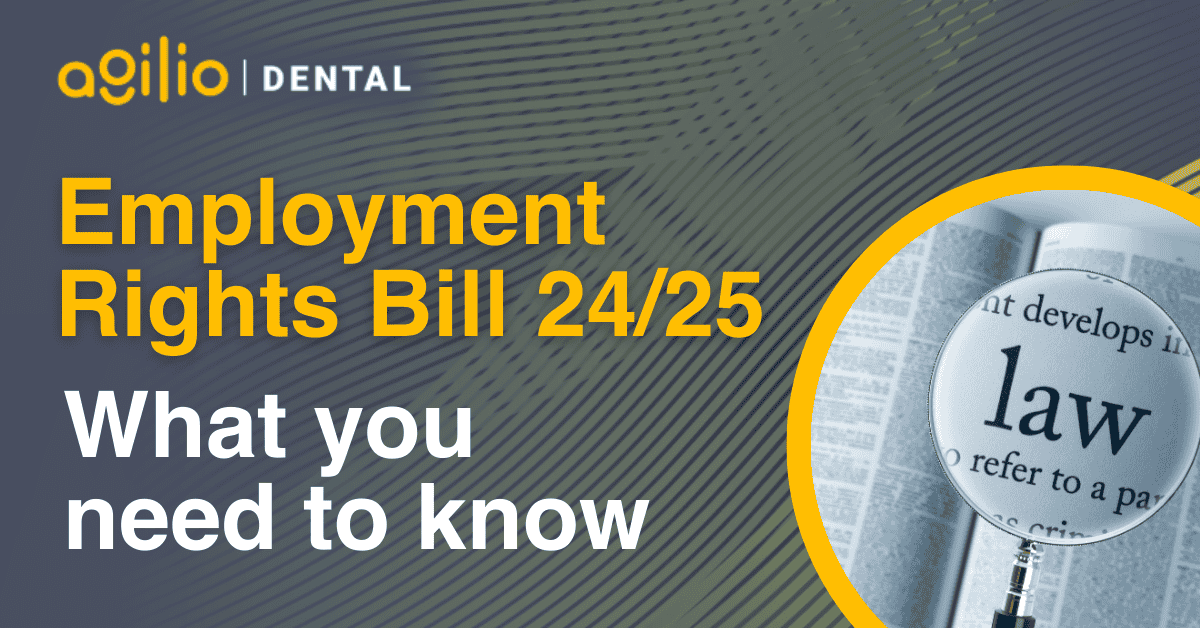Agilio Software’s iTeam HR manager, Roxanne Gibson, discusses the changes to the Employment Rights Bill coming in April 2025 and what that means for dental practices.
With the Employment Rights Bill set to have such a dramatic impact on managing workforces, I want to share some more detail on a few of the individual aspects of the bill that I believe will have the biggest impact for employers.
There are a number of proposals within the bill, and this will be my first update of many!
The Employment Rights Bill, which was introduced to Parliament on 10 October 2024, is the first phase of delivering the Plan to Make Work Pay, supporting employers, workers, and Unions to get Britain moving forward and fulfilling a commitment to introduce legislation within 100 days. The bill will update and modernise the legislative framework in relation to employment rights and is the biggest change to worker rights in decades.
Thankfully, many of the changes will not come in until at least Autumn of 2026, so there is plenty of time to get ready, and we will support you and ensure you are informed and have all the necessary processes, policies and procedures to navigate this.
Ahead of the changes coming in in 2026, there are two changes coming in April 2025 that you will need to be aware of:
National Minimum & National Living wage increase
These updated rates are designed to reflect economic conditions and support employees with the cost of living.
The Government has confirmed the new rates that will come into effect from April 2025. These are as follows:
- National Living Wage (21 and over): £12.21 per hour
- National Minimum Wage 18–20-year-olds: £10.00 per hour
- National Minimum Wage 16–17-year-olds: £7.55 per hour
- Apprentices: £7.55 per hour (applies to apprentices under 19 or those over 19 in the first year of their apprenticeship)
Neonatal Care Leave & Pay
Neonatal Care Leave is a new statutory right giving eligible employees up to 12 weeks of paid leave if their baby requires neonatal care within the first 28 days after birth. The leave is in addition to existing entitlements such as maternity, paternity, adoption, and shared parental leave. We have created a new policy with full details about how to manage this in practice, which is due to be released shortly, and you will be alerted to this update.
So, let’s look at some of the proposals that are set to have the biggest impact on employers coming in 2026 (subject to parliament approval):
Day One Rights
- Unfair Dismissal. The way you manage your staff and handle dismissal will change. There will be no ‘2 year rule’ and employees will be able to claim unfair dismissal from day one.
- The way flexible working requests are handled will change. There is likely to be a rise in employees requesting flexible working, and if this is not possible to accommodate, you will need to be able to evidence why.
- Statutory Sick Pay. The Lower Earning Limit (LEL) and waiting period for sick pay will be removed. This means your employees will be paid from day one of sickness instead of the fourth day.
- Family Friendly leave- Unpaid parental and paternity leave. This will remove the qualifying period for parents wanting to take paternity leave and unpaid parental leave.
The Worker Protection (Amendment of Equality Act 2010) Act was introduced on 26th October 2024, placing a new duty on employers to take reasonable steps to prevent sexual harassment (i.e., unwanted conduct of a sexual nature) of employees in the course of employment. Under Labours proposal, they are proposing to further strengthen this legislation and connect it to protected characteristics. We have been helping our members navigate this significant change and impact on businesses. Please get in touch with us [email protected] for further support and advice in this area.
Self-employed status: Proposal to “clear it up”
We are already aware that this is a grey area. There is currently no statute of descriptions of workers and employment status to date has been developed through case law. Labour want to address the one-sided (in favour of the employer) flexibility of the worker status in particular (the term given to people employed on zero-hours contracts).
If employment status categorising becomes clearer, we could see a shift in associates shifting from self-employed to employed.
Just in, we have been informed that employment tribunal claims limitation has increased from 3 months to 6 months. This in turn means a higher risk of exposure to litigation.
A recurring theme coming out of this bill is a need to carefully consider any HR decisions you make, which could mean needing to spend more time than you currently do managing your team, to ensure HR compliance.
With any legislation changes, unfortunately the risk of litigation increases. When litigation increases, there is an associated cost and stress.
Our outsourced HR service at Agilio will ensure you are getting all of the relevant updates and advice as and when this bill is progressed through parliament, putting you in the best position to run your business knowing you are complying with the latest legislation. We can also help you to reduce the amount of time you are spending on HR tasks and ultimately reduce the litigation risk.
It is vital your company’s documentation, contracts, and policies are updated and that you prepare for these changes in advance. Failure to remain compliant could lead to an average cost of £11,914 per tribunal claim. Let Agilio help you navigate this dynamic bill!
If you are a member or want to know more about how we can help, please contact [email protected]

